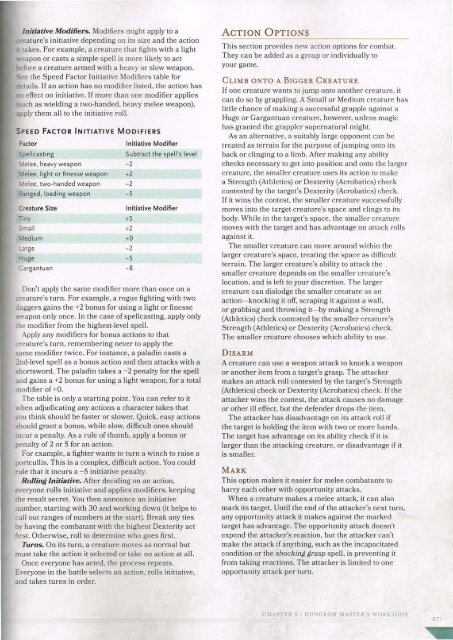Dungeon Master's Guide
You also want an ePaper? Increase the reach of your titles
YUMPU automatically turns print PDFs into web optimized ePapers that Google loves.
Initiative Modifiers. Modifiers might apply to a<br />
-eature's initiative depending on its size and the action<br />
- rakes. For example, a creature that fi ghts with a light<br />
eapon or casts a simple spell is more likely to act<br />
fore a creature armed with a heavy or slow weapon.<br />
:ee the Speed Factor Initiative Modifiers table for<br />
: rails. If an action has no modifier listed, the action has<br />
- effect on initiative. If more than one modifier applies<br />
such as wielding a two-handed, heavy melee weapon),<br />
.ipply them all to the initiative roll.<br />
SPEED FACTOR INITIATIVE MODIFIERS<br />
ractor<br />
Spellcasting<br />
.1elee, heavy weapon<br />
elee, light or finesse weapon<br />
el ee, two-handed weapon<br />
~an ged, loading weapon<br />
Creature Size<br />
- iny<br />
Small<br />
.1 edium<br />
_arge<br />
-l uge<br />
Gargantuan<br />
Initiative Modifier<br />
Subtract the spell's level<br />
- 2<br />
+2<br />
-2<br />
-5<br />
Initiative Modifier<br />
+5<br />
+2<br />
+0<br />
-2<br />
-5<br />
- 8<br />
Don't apply the same modifier more than once on a<br />
creature's turn. For example, a rogue fighting with two<br />
daggers gains the +2 bonus for using a light or finesse<br />
weapon only once. In the case of spellcasting, apply only<br />
the modifier from the highest-level spell.<br />
Apply any modifiers for bonus actions to that<br />
creature's turn, remembering never to apply the<br />
same modifier twice. For instance, a paladin casts a<br />
2nd-level spell as a bonus action and then attacks with a<br />
-hortsword. The paladin takes a -2 penalty for the spell<br />
and gains a +2 bonus for using a light weapon, for a total<br />
modifier of +0.<br />
The table is only a starting point. You can refer to it<br />
when adjudicating any actions a character takes that<br />
you think should be faster or slower. Quick, easy actions<br />
hould grant a bonus, while slow, difficult ones should<br />
incur a penalty. As a rule of thumb, apply a bonus or<br />
penalty of 2 or 5 for an action.<br />
For example, a fighter wants to turn a winch to raise a<br />
portcullis. This is a complex, difficult action. You could<br />
rule that it incurs a -5 initiative penalty.<br />
Rolling Initiative. After deciding on an action,<br />
everyone rolls initiative and applies modifiers, keeping<br />
rhe result secret. You then announce an initiative<br />
number, starting with 30 and working down (it helps to<br />
call out ranges of numbers at the start). Break any ties<br />
by having the combatant with the highest Dexterity act<br />
fi rst. Otherwise, roll to determine who goes first.<br />
Turns. On its turn, a creature moves as normal but<br />
must take the action it selected or take no action at all.<br />
Once everyone has acted, the process repeats.<br />
Everyone in the battle selects an action. rolls initiative,<br />
and takes turns in order.<br />
ACTION OPTIONS<br />
This section provides new action options for combat.<br />
They can be added as a group or individually to<br />
your game.<br />
CLIMB ONTO A BIGGER CREATURE<br />
If one creature wants to jump onto another creature, it<br />
can do so by grappling. A Small or Medium creature has<br />
little chance of making a successful grapple against a<br />
Huge or Gargantuan creature, however, unless magic<br />
has granted the grappler supernatural might.<br />
As an alternative, a suitably large opponent can be<br />
treated as terrain for the purpose of jumping onto its<br />
back or clinging to a limb. After making any ability<br />
checks necessary to get into position and onto the larger<br />
creature, the sma ller creature uses its action to make<br />
a Strength (Athletics) or Dexterity (Acrobatics) check<br />
contested by the target's Dexterity (Acrobatics) check.<br />
If it wins the contest, the smaller creature successfully<br />
moves into the target creature's space and clings to its<br />
body. While in the target's space, the smaller creature<br />
moves with the target and has advantage on attack rolls<br />
against it.<br />
The smaller creature can move around within the<br />
larger creature's space, treating the space as difficult<br />
terrain. The larger creature's ability to attack the<br />
smaller creature depends on the smaller creature's<br />
location, and is left to your discretion. The larger<br />
creature can dislodge the smaller creature as an<br />
action- knocking it off, scraping it against a wall,<br />
or grabbing and throwing it- by making a Strength<br />
(Athletics) check contested by the smaller creature's<br />
Strength (Athletics) or Dexterity (Acrobatics) check.<br />
The smaller creature chooses which ability to use.<br />
DISARM<br />
A creature can use a weapon attack to knock a weapon<br />
or another item from a target's grasp. The attacker<br />
makes an attack roll contested by the target's Strength<br />
(Athletics) check or Dexterity (Acrobatics) check. If the<br />
attacker wins the contest, the attack causes no damage<br />
or other ill effect, but the defender drops the item.<br />
The attacker has disadvantage on its attack roll if<br />
the target is holding the item with two or more hands.<br />
The target has advantage on its ability check if it is<br />
larger than the attacking creature, or disadvantage if it<br />
is smaller.<br />
MARK<br />
This option makes it easier for melee combatants to<br />
harry each other with opportunity attacks.<br />
When a creature makes a melee attack, it can also<br />
mark its target. Until the end of the attacker's next turn,<br />
any opportunity attack it makes against the marked<br />
target has advantage. The opportunity attack doesn't<br />
expend the attacker's reaction, but the attacker can't<br />
make the attack if anything, such as the incapacitated<br />
condition or the shocking grasp spell, is preventing it<br />
from taking reactions. The attacker is limited to one<br />
opportunity attack per turn.<br />
CHAPTER 9 I DUNGEON MASTER'S WORKSHOP




